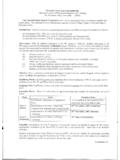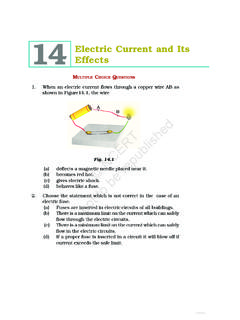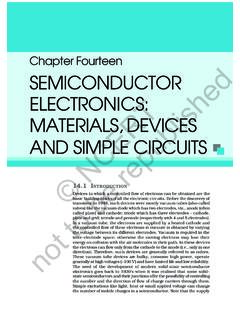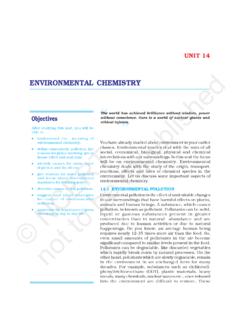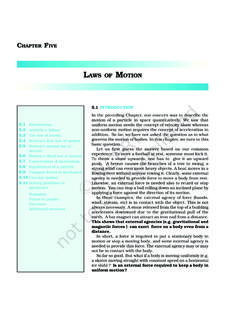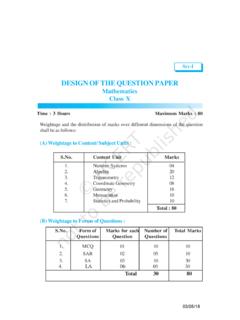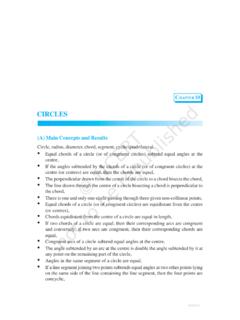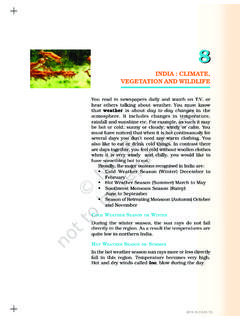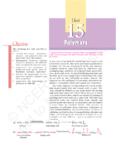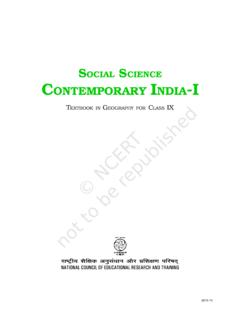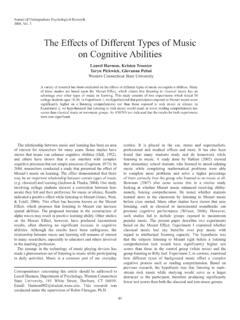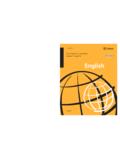Transcription of Learning Outcomes at the Higher Secondary Stage 1 ... - NCERT
1 Learning Outcomes at the Higher Secondary Stage 1. LANGUAGES English Hindi Sanskrit Urdu 1 13 14 24 25 43 44 51 2. MATHEMATICS Mathematics 52 64 3. SCIENCE Biology Chemistry Physics 65 79 80 93 94 109 4. SOCIAL SCIENCES Economics Geography History Political Science Psychology Sociology 110 119 120 129 133 146 147 155 156 177 178 186 5. COMMERCE Accountancy Business Studies 187 194 195 200 6. FINE ARTS Visual Arts Painting Music 201 220 221 255 7. Health & Physical Education 256 268 8. Human Ecology And Family Science 269 289 9. Development Team 290 294 Learning Outcomes at Higher Secondary Stage NATIONAL COUNCIL OF EDUCATIONAL RESEARCH AND TRAINING FOREWORD Every human being is different from other living beings in ways they continuously construct their knowledge. A little child constructs knowledge blocks, bits-by-bits, reasoning what , why and how with real/concrete objects using sensory/intellectual abilities.
2 This process results into enriching experiences. The school undertakes the responsibility of building further Learning on the child s existing experiences. A teacher who is a facilitator of students Learning needs to be aware about various pedagogies and also the progress in the child s Learning from early stages to Higher stages. The system of education, too, needs to ensure enabling conditions to allow each learner to learn and progress with own place. Schools need to recognize learners capacity to construct knowledge as a natural learner and the knowledge as an outcome of engagement with the world around when learner explores, responds, invents and makes meaning of it. Focus must be on the process of Learning in place of product of Learning emphasizing competency-based educational process. The National Education Policy (NEP) 2020 has emphasized the need of Learning Outcomes for competency based teaching, Learning and assessment at all stages of school education.
3 It also recommend Holistic Progress Card, which need to take care of assessment of all the aspects leading to holistic development of our children. In order to translate process based Learning and assessment into practice, the NCERT brought out Learning Outcomes at Elementary Stage in 2017 and at Secondary Stage in 2019. As a follow-up of NEP, 2020 discussions, it was felt essential that the entire school education to centre around competency based teaching- Learning . Henceforth, NCERT undertook the task of developing Learning Outcomes for the Higher Secondary Stage . The present document Learning Outcomes at Higher Secondary Stage aims to cover the whole spectrum of school education alongwith the other two documents on Learning Outcomes . Learning Outcomes in 20 curricular areas at Higher Secondary Stage have been delineated in terms of curricular expectations and suggested pedagogical processes in simple and lucid manner in the lines of earlier Learning Outcome documents.
4 This Learning Outcomes document has been prepared in a team by the faculty members of NCERT through internal deliberations, internal review by Review Committees constructed for this purpose and sharing with external resource persons finally resulting into the present form. The contribution of each team member within NCERT and also of the external experts is profoundly acknowledged. I hope that this document will be helpful not only to teachers, teacher-educators schools, policy planners and also the evaluators and examiners in making the assessment competency based. Comments and suggestions are invited to bring further improvement to the quality of this document. (Hrushikesh Senapaty) 1 Learning Outcomes FOR THE ENGLISH LANGUAGE Higher Secondary Stage Introduction Language is not only a means of communication, it is also a medium through which most of our knowledge is acquired. It is a system that, to a great extent, structures the reality around us.
5 Language acquisition involves processes of scientific enquiry such as observation of data, classification and categorization, hypothesis formation and its verification. It should be possible to use the languages available in the classroom not only for the enhancement of above cognitive abilities but also for increasing language proficiency and sensitivity. Such exercises prove particularly useful in the conscious use of language rules in formal situations. Learners are expected to possess such competencies which enable them to face the world in the true sense-both academic and work place world. Language proficiency and competencies are vital in nurturing and shaping the learner to negotiate, function, develop attitudes, social skills, critical and liberal thinking and values in the academic, work place and society as a whole. Language Learning is essentially a process of acquiring language skills across the curriculum enabling the learners to achieve academic success and holistic personality development.
6 The relevant learner centric academic inputs take learners beyond the boundaries of textbook for exploration of ideas, thoughts, and beliefs in a larger arena of people and life. Secondary Stage is crucial for there is transition from general school education of ten years to stream based courses leading to another transition to Higher education or work place. The progression in this process leads to understanding abstract thoughts and unfamiliar contexts at the Secondary Stage . It leads to construction of knowledge across the curriculum. The most crucial aspect is the implementation of pedagogies meant for quality Learning and balanced assessment. Hence at the Secondary Stage there is need to have more flexibility and resourcefulness than teaching to test. Educators are expected to blend the discipline content with engaging Learning environment. Promising practices may be followed to narrow the achievement gaps among the learners. It is expected to develop a range of skills subsumed under Basic Interpersonal Communication Skills (BICS) and Cognitively Advanced Language Proficiency (CALP) by the end of class 2 xii.
7 Attributes of learners at the end of class XII would present them as an adult with knowledge, competencies, skills, and attitudes for a good citizenry who could pursue his / her academic interest and acquire Higher order skills with specializations of varied nature. Language Learning at the senior Secondary Stage should ensure registered based language requirement of Higher education. The competencies should focus on register based language proficiency viz. science registers, social science registers, language for technology and so on. This could be achieved through the inputs of materials (texts and others), teachers language, the classroom interactions and assessment. Learning Outcomes delineated here include the above aspects to pave way for Learning of the language for varied purposes. Learning Outcomes at the end of the Secondary Stage - an Overview Learning Outcomes are concise, and clearly articulated recommendations for the academic and overall achievements of the learners.
8 These are the part of the process of Learning which are based on the learner centric approaches. There is no linear progression suggested for the learners. Learners can have flexibility in assessment/ examination. This will lead to giving space to learners to follow their pace of Learning without being labelled as slow, weak etc. Educators can modify activities, tasks etc. as per the Learning Outcomes . The processes highlight art integrated Learning and inclusive approach for Learning . Equal opportunities are given to all students to develop the communication skills. Conscious effort has been made to shift from memorization to the development of language competencies along with the competencies to function as an informed youth to work towards the societal upliftment and grow as a productive individual. Value inculcation is integrated in pedagogical processes and in Los. Different pedagogical processes are suggested for development of these competencies.
9 These ensure integrated and seamless Learning . These competencies can be observed and assessed. The real life application of understanding can be assessed as evidenced by the students performance of authentic tasks and participation in group project. 3 The framework of Learning Outcomes is focused on the holistic development of young learners who are at the threshold of entering the world of Higher education, employment, professional courses etc. Some of them may move to different parts of the world for the purpose of education or other reasons. Curricular Expectations After class XII students will leave the protected atmosphere of school and go into the world of independence as well as responsibility. So the two years of senior Secondary Stage is a preparatory Stage to face life and take decision. The pedagogical processes suggested and Learning Outcomes stated work towards this. Learning Outcomes and pedagogical processes make an effort to groom the students to be independent learners.
10 The teachers can adopt, adapt or modify the suggestive pedagogical processes according to the needs, contexts and resources available. Learners at the end of the senior Secondary Stage , classes XII are expected to; acquire the ability to listen and understand, and should be able to employ non-verbal clues to make connections and draw inferences. develop the habit of reading for information and pleasure; draw inferences and relate texts to previous knowledge; read critically and develop the confidence to ask and answer questions. employ her communicative skills, with a range of styles, and engage in a discussion in an analytical and creative manner. identify a topic, organize and structure thoughts and write with a sense of purpose and an awareness of audience. to understand and use a variety of registers associated with domains such as music, sports, films, gardening, construction work, etc. use a dictionary and other materials available in the library and elsewhere, access and collect information through making and taking down notes, etc.
